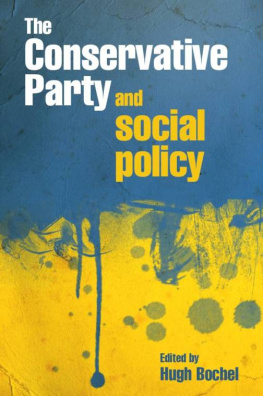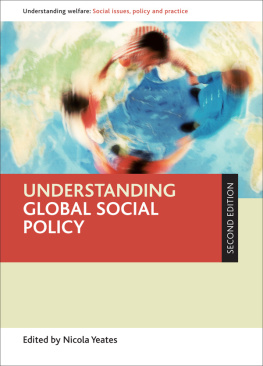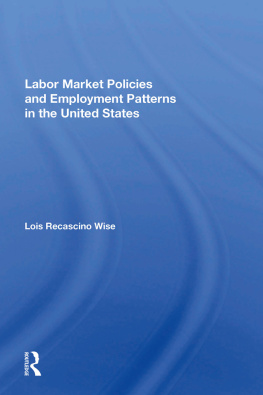Published by State University of New York Press, Albany
2014 State University of New York
All rights reserved
Printed in the United States of America
No part of this book may be used or reproduced in any manner whatsoever without written permission. No part of this book may be stored in a retrieval system or transmitted in any form or by any means including electronic, electrostatic, magnetic tape, mechanical, photocopying, recording, or otherwise without the prior permission in writing of the publisher.
For information, contact State University of New York Press, Albany, NY
www.sunypress.edu
Production Diane Ganeles
Marketing Anne M. Valentine
Library of Congress Cataloging-in-Publication Data
VanSickle-Ward, Rachel, 1977-
The devil is in the details : understanding the causes of policy specificity and ambiguity / Rachel VanSickle-Ward.
pages cm
Includes bibliographical references and index.
ISBN 978-1-4384-4923-4 (hardcover : alk. paper) 1. LegislationUnited States. 2. Public policy (Law)United States. 3. Legislative bodiesUnited StatesStates. I. Title.
KF4945.V36 2014
328.73'077dc23
2013002458
10 9 8 7 6 5 4 3 2 1
For Neil, Becca, and Mom
ACKNOWLEDGMENTS
T his book has benefited immeasurably from the support, counsel, and encouragement of many people. Because it grew out of my dissertation, my first round of thanks goes to my committee at UC Berkeley. Judy Gruber generously imparted her knowledge of bureaucratic policy-making and her unerring sense of a convincing argument. The basic question of this book was shaped in conversations with her, conversations that ranged from penetrating questions about variable measurement to her trademark Jewish mother's attentiveness to my diet and sleep habits. I miss her greatly. Bob Kagan's generous mentorship and careful reading of my work improved my thinking and writing about statute specificity. This project engages his scholarship, and I relied heavily on his expertise. Margaret Weir and John Ellwood provided important feedback about framing and research design. Finally, Bruce Cain opened numerous doors for this project, from securing funding to suggesting new and fruitful ways to consider the data. I deeply appreciate his knack for getting to the crux of a question, his frank and constructive critiques, his jovial good nature, and his consistent support and enthusiasm.
Berkeley also afforded the great fortune of spending several years among the best graduate students in the business, and I am especially lucky to count many of them as dear friends. Jocelyn Kiley, Rosie Hsueh, Jane Gingrich, Diana Kapiszewski, Libby Anker, Matt Grossman, Sarah Laubach, Darshan Goux, Josh Wilson, and Megan Mullin all gave me helpful feedback on various aspects of this project. My thanks to Jill Greenlee, Tatishe Nteta, and Kevin Wallsten, who talked through nascent ideas, helped me interpret thorny findings, commented on drafts, and kept me laughing the whole time. Jill especially provided wise and detailed feedback from start to finish, including reading multiple chapter drafts. I cannot thank her enough.
I am also extraordinarily grateful to my colleagues at Pitzer College and the Claremont Colleges, who have supported me in the journey from dissertation to book. To be welcomed as a colleague by the very people who inspired me as an undergraduate to try this gig in the first place has been a gift beyond measure. Thanks are due to my supportive field group: Adrian Pantoja, Geoffrey Herrera, Nigel Boyle, Sharon Snowiss, and Lako Tongun. My thanks especially to Tom Ilgen. Tom may not have realized when he agreed to serve as my undergraduate advisor sixteen years ago that he would be advising me to this day, but he nevertheless does so with unflagging wisdom and generosity. The late and dearly missed Ellin Ringler-Henderson inspired my love of language and my fascination with precision and ambiguity therein. Emma Stephens, Kathy Yep, Brinda Sarathy, Jenn Merolla, and Amanda Hollis-Brusky offered thoughtful critiques, moral support, and, in Emma's case, space to work and the occasional STATA intervention.
Several talented undergraduates at Berkeley and Pitzer provided excellent research assistance for this project. I owe a debt of gratitude to Dalia Yadegar, Yesel Lee, Ashley Paschal, Lisi Kent Isaac, Hannah Wei, Evan Slovak, and Alec Lentz for their insights, enthusiasm, and careful help with coding, literature, and press and policy searches. I am also profoundly grateful to the many individuals who volunteered their time and expertise for interviews. These respondents took time out of their busy schedules to speak with me, often offering tangible examples, tracking down archival material, and suggesting other sources. Emily Baird transcribed the interviews with great care. Carolyn Holmes read the manuscript in its entirety and provided invaluable editorial counsel. Peverill Squire, Jerry Wright, and Fred Boehmke generously shared and/or helped me locate data. Jeff Isaac provided feedback on the introduction.
Many thanks go to my terrific editors at State University of New York Press, Michael Rinella and Diane Ganeles, who skillfully stewarded this project throughout the publication process. I am grateful to the anonymous reviewers at State University of New York Press for their thoughtful and careful critiques. Their comments significantly improved the manuscript; any remaining errors are mine alone. I am also grateful to Enid Zafran for her work on the index. Portions of were originally published in the State and Local Government Review, and I appreciate the opportunity to include them here. Aspects of this project were presented at University of California at Berkeley, Pitzer, Pomona, and Lafayette colleges, and at annual meetings of the Midwest Political Science Association, the Western Political Science Association, and the State Politics and Policy conference, and I appreciate the feedback received at all of those forums. Financial support came in the form of grants from the Graduate Division, the Travers Department of Political Science, and the Institute of Governmental Studies at the University of California at Berkeley, and faculty research grants from Pitzer College.
My friends and family have been incredibly supportive and patient throughout this process. My thanks go to Mom, Andy, Dad, Deb, Zack, Mitch, Rich, Carrie, Joel, and my grandparents for cheering me on. A special thank you to my mom, who drops everything if I need a hand and inspires me to be a great teacher. I frankly don't have the words to adequately thank my remarkable daughter Becca and husband Neil for the many ways in which they inspire, encourage, and sustain me. I will simply say thank you to Becca for reminding me that books about Curious George are just as important as books about statute specificity, and to Neil for making me a martini every Friday night.










